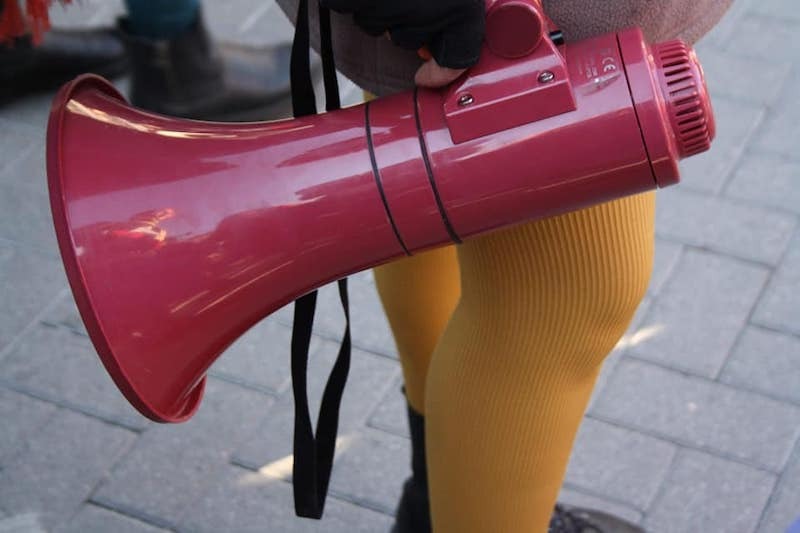Albanian students are leading game-changing, feminist protests in the streets

For 45 years between 1946 and 1991, Albania existed under a totalitarian regime. In the 28 years since this regime ended, while Albania transitioned to becoming a constitutional republic, only one significant protest occurred in the country — that against the import of chemical weapons in 2013. But in the final months of 2018, this maintenance of the status quo changed as students, particularly young women, began to take to the streets to advocate for their rights.
To understand these recent protests, we must first revisit an Albanian law proposed in 2014 to raise tuition fees for higher education, essentially increasing public university fees until they would be equivalent to private ones. This increase would result in universities no longer being accessible to many students; Young people would be filtered by their economic status and deprived of educations. The “clientelist law” inspired the birth of the student-driven movement known as “Për Universitetin" (“For the University”) in 2014, but the law still passed Albania’s Parliament in 2015.
Students didn’t give up the fight, however, and continued to organize and protest over the years — but those protests weren’t well covered by the media. On December 4, 2018, however, the group began a days-long campaign of protests that were impossible for the media to ignore. The protests started at the Department of Urban Planning at the University of Tirana, then spread to other departments at the university, then spread even further. On the third day of protests, several hundred students blocked the entrances of the Ministry of Education in Albania’s capital. A week in, they blocked a major highway in the city of Tirana. Thousands of students are still protesting now.
But even though the media has started to cover these protests generally, it has failed to note the feminist principles at the heart of them and how women in particular have contributed to the movement. First and foremost, women have outnumbered men at these protests; their persistence, strength, and intelligence have made them the critical voices of the movement. But more importantly, this movement has recognized that it cannot protest economic equality without also addressing gender inequality — that it’s impossible to differentiate capitalism from the patriarchy because these systems feed on each other.
An important part of this movement, therefore, has been for female students to discuss the sexism and sexual harassment they have faced at their universities. During the first weeks of these marathon protests, students reported several professors for sexual harassment in the ongoing afternoon meetings during which students and professors meet to plan the next day’s protest. These reports were supported by other students, and resulted in an architecture professor of Polytechnic University, Thanas Nushi, resigning shortly after dozens of students accused him of sexually harassing students and abusing the power of his position.
In order to continue to raise awareness of these flagrant cases of sexism, activists of the Për Universitetin movement organized a separate but related solidarity action on January 7. On January 6, all female protestors were asked to engage in a “miniskirt protest.” Female protestors wore miniskirts to send the message that girls and women have the right to dress however they choose, and their choice is not a provocation against anyone else. Other protesters and professors welcomed and stood in solidarity with this act by sharing it on their personal social media accounts, accompanied by encouraging notes. Jani Marka, a male professor of natural sciences, spoke at the protest in support, stating, “With this act today, all of you girls, our students, made us feel very...ashamed that we’ve done nothing on this direction.”
While this action was applauded by many, however, it was not applauded by all. Some sites that wrote about the “miniskirt protest” were flooded with sexist comments like, "emancipation is not going to come from girls’ legs” or "do not mix feminism with the cause of education.”
These ignorant responses prove why having access to education for all is so important in Albania. Albanian women are still largely expected to fit our “biological role” of domesticity. We’re supposed to be devoted mothers who have to give up our studies after high school for the sake of raising a "healthy family." We’re supposed to present ourselves conservatively: Women who wear miniskirts, short dresses, or tops with a décolleté are seen as provoking men and wearing mini-skirts is used as justification for any violence committed against them. This is why those of us who participated in the miniskirt protest did so.
History so far has been written by and about men, but part of what this protest advocates for is marginalized people’s ability to be educated so that they can write their own history in addition to writing and talking about themselves and their points of view. While we protest for a society that allows us better access to education — and, relatedly, better treatment of women — the negative comments and/or obstacles we face in response only show us why we must continue to organize to emancipate our society in every way we can.
More articles by Category: Education, International
More articles by Tag: Activism and advocacy, College, Equality, Sexual harassment, Sexualized violence, Women's leadership



























